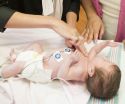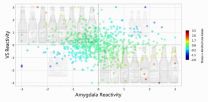(Press-News.org) BOSTON - Hospitals have made significant strides to reduce or eliminate physical harm to patients since the landmark 1999 Institute of Medicine Report "To Err is Human." In a new paper published in BMJ, patient care leaders at Beth Israel Deaconess Medical Center (BIDMC) say hospitals must now devote similar attention to eliminating emotional harms that damage a patient's dignity and can be caused by a failure to demonstrate adequate respect for the patient as a person.
"Emotional harms can erode trust, leave patients feeling violated and damage patient-provider relationships," writes lead author Lauge Sokol-Hessner, MD, a clinician in the BIDMC Hospital Medicine program and the Associate Director of Inpatient Quality. "Such injuries can be severe and long-lasting, with adverse effects on physical health. Failure to acknowledge and systematically address these harms ensures that they continue."
"For these emotional harms, we are where we were with patient safety before 1999: we know they occur but lacking a systemic approach to capture, categorize or assess them, we struggle to understand root causes and prevent future events," writes Sokol-Hessner. "We do not have reliable estimates of how often such harms occur, but some evidence suggests that they may be more prevalent than physical harms."
Previous studies have shown patients often emphasize emotional rather than physical harm in discussing adverse events. Such harms may include a failure to conduct a sensitive conversation in a suitably private setting; misplacing or losing sentimental objects; or "never events" such as sending a funeral home the wrong body after a patient passes away.
In their BMJ paper, the authors highlight the work BIDMC has done to promote dignity and respect in patient care. In 2008, the medical center launched an effort to publicly report a variety of patient safety issues as part of its effort to reduce and eliminate physical harms. Building on this work, BIDMC also made a significant commitment to defining the loss of dignity and respect as a preventable harm and taking active steps to prevent them.
BIDMC convened a multidisciplinary "Respect and Dignity" Workgroup - with representatives from across the medical center, including health care quality, patient safety, ethics, social work, interpreter services, patient relations, and the Patient Family Advisory Council.
The BIDMC team set out to define emotional harm as something that affects a patient's dignity by the failure to demonstrate adequate respect for the patient as a person. That definition acknowledges that not all emotional harm is a consequence of a human failure to demonstrate respect. For example, a patient may be embarrassed by a requiring a post-surgical colostomy bag or harmed by the lack of privacy because a hospital does not have enough private rooms.
BIDMC then made a commitment to identifying and tracking emotional harms using the same databases used to document physical harms.
"Ensuring that our profession does not cause preventable harm to our patients requires that we address emotional harms with the same rigor we have applied to physical harms," adds Kenneth E. Sands, MD, MPH, senior author and BIDMC's Senior Vice President of Health Care Quality and Chief Quality Officer at the Silverman Institute for Health Care Quality and Safety.
"A reliable culture of respect for patients almost certainly requires a culture of respect among organizational leaders and staff," adds co-author Patricia Folcarelli, RN, PhD, Senior Director of Patient Safety at BIDMC.
The authors stress that health care facilities must also identify and acknowledge personal and systemic factors that may be associated with emotional harms, such as a lack of training, a stressful work environment or faulty systems of care.
Reported cases of loss of respect need to be reviewed with a root cause analysis similar to ones used for physical harm because "our early experience with emotional harms is that they are often the result of multiple failures." These failures might involve not only the provider's skills and attitude but also the work environment, information technology systems and care team communication.
"There are many challenges in this work, including establishing operational definitions of 'respect' across culturally diverse patient populations," Sands notes. "Overcoming these challenges should become our mission as we fulfill our fundamental ethical responsibility to 'do no harm.'"
INFORMATION:
The work of the BIDMC "Respect and Dignity" Workgroup is supported in part by a grant from the Gordon and Betty Moore Foundation.
Beth Israel Deaconess Medical Center is a patient care, teaching and research affiliate of Harvard Medical School and consistently ranks as a national leader among independent hospitals in National Institutes of Health funding.
BIDMC is in the community with Beth Israel Deaconess Hospital-Milton, Beth Israel Deaconess Hospital-Needham, Beth Israel Deaconess Hospital-Plymouth, Anna Jaques Hospital, Cambridge Health Alliance, Lawrence General Hospital, Signature Healthcare, Beth Israel Deaconess HealthCare, Community Care Alliance and Atrius Health. BIDMC is also clinically affiliated with the Joslin Diabetes Center and Hebrew Rehabilitation Center and is a research partner of Dana-Farber/Harvard Cancer Center and The Jackson Laboratory. BIDMC is the official hospital of the Boston Red Sox. For more information, visit http://www.bidmc.org.
LAWRENCE -- A new study that is the first to use Social Security Administration's personal income tax data tracking the same individuals over 20 years to measure individual lifetime earnings has confirmed significant long-term economic benefits of college education.
ChangHwan Kim, a University of Kansas researcher, said the research team was also able to account for shortcomings in previous studies by including factors such as gender, race, ethnicity, place of birth and high school performance that would influence a person's lifetime earnings and the probability of college ...
A study by City College of New York physicists Flaviano Morone and Hernán A. Makse suggests that "smaller is smarter" when it comes to influential superspreaders of information in social networks. This is a major shift from the widely held view that "bigger is better," and could have important consequences for a broad range of social, natural and living networked systems.
"The problem of identifying the minimal set of influential nodes in complex networks for maximizing viral marketing in social media, optimizing immunization campaigns and protecting networks under ...
ROCHESTER, Minn. - Opioid painkiller addiction and accidental overdoses have become far too common across the United States. To try to identify who is most at risk, Mayo Clinic researchers studied how many patients prescribed an opioid painkiller for the first time progressed to long-term prescriptions. The answer: 1 in 4. People with histories of tobacco use and substance abuse were likeliest to use opioid painkillers long-term.
The findings are published in the July issue of the medical journal Mayo Clinic Proceedings.
While the study identified past or present nicotine ...
Premature babies are at an increased risk for developing autism spectrum disorder. But a small study indicates that preemies who avoid eye contact in early infancy are less likely to demonstrate symptoms of autism at age 2 than preemies who maintain eye contact during early interactions, according to new research at Washington University School of Medicine in St. Louis.
"Children with autism typically have challenges with social interaction and may avoid eye contact, but it turned out that children in this study who had characteristics of autism at age 2 were more likely ...
ROSEMONT, Ill.--Participation in sports by women and girls has increased from 310,000 individuals in 1971 to 3.37 million in 2010. At the same time, sports-related injuries among female athletes have skyrocketed. According to a new study in the Journal of the American Academy of Orthopaedic Surgeons (JAAOS), women with symptoms known as the "female athlete triad" are at greater risk of bone stress injuries and fractures.
"The female athlete triad is a spectrum of symptoms that include low energy availability, menstrual cycle abnormalities, and low bone mineral density. ...
There may be far fewer galaxies further out in the universe then might be expected, according to a new study led by Michigan State University.
Over the years, the Hubble Space Telescope has allowed astronomers to look deep into the universe. The long view stirred theories of untold thousands of distant, faint galaxies. The new research, appearing in the current issue of the Astrophysical Journal Letters, however, offers a theory that reduces the estimated number of the most distant galaxies by 10 to 100 times.
"Our work suggests that there are far fewer faint galaxies ...
People have evolved to be smarter and taller than their predecessors, a study of populations around the world suggests.
Those who are born to parents from diverse genetic backgrounds tend to be taller and have sharper thinking skills than others, the major international study has found.
Researchers analysed health and genetic information from more than 100 studies carried out around the world. These included details on more than 350,000 people from urban and rural communities.
The team found that greater genetic diversity is linked to increased height. It is also ...
The European Space Agency's Rosetta spacecraft first began orbiting comet 67P/Churyumov-Gerasimenko in August 2014. Almost immediately, scientists began to wonder about several surprisingly deep, almost perfectly circular pits on the comet's surface. Now, a new study based on close-up imagery taken by Rosetta suggests that these pits are sinkholes, formed when ices beneath the comet's surface sublimate, or turn directly to gas.
The study, which appears in the July 2, 2015 issue of the journal Nature, reveals that the surface of 67P/Churyumov-Gerasimenko is variable and ...
DALLAS - July 1, 2015 - UT Southwestern Medical Center scientists collaborating with University of Michigan researchers have found a previously unidentified mechanism that helps explain why stem cells undergo self-renewing divisions but their offspring do not.
Adult stem cells provide a ready supply of new cells needed for tissue homeostasis throughout the life of an organism. Specialized environments called "niches" help to maintain stem cells in an undifferentiated and self-renewing state. Cells that comprise the niche produce signals and growth factors essential for ...
DURHAM, N.C. - A pair of brain-imaging studies suggest researchers may be able to predict how likely young adults are to develop problem drinking or engage in risky sexual behavior in response to stress.
The new research is part of the ongoing Duke Neurogenetics Study (DNS), which began in 2010 to better understand how interactions between the brain, genome and environment shape risky behaviors that can predict mental illnesses including depression, anxiety, and addiction.
"By knowing the biology that predicts risk, we hope to eventually change the biology -- or at ...



